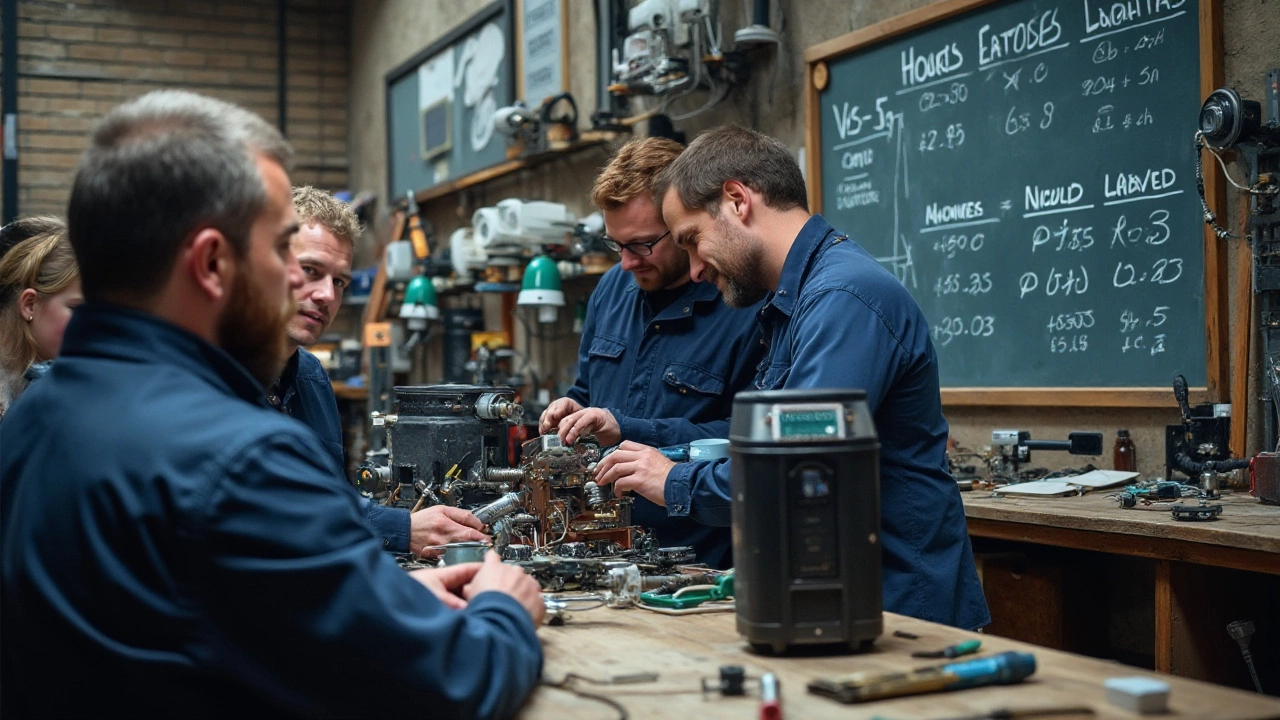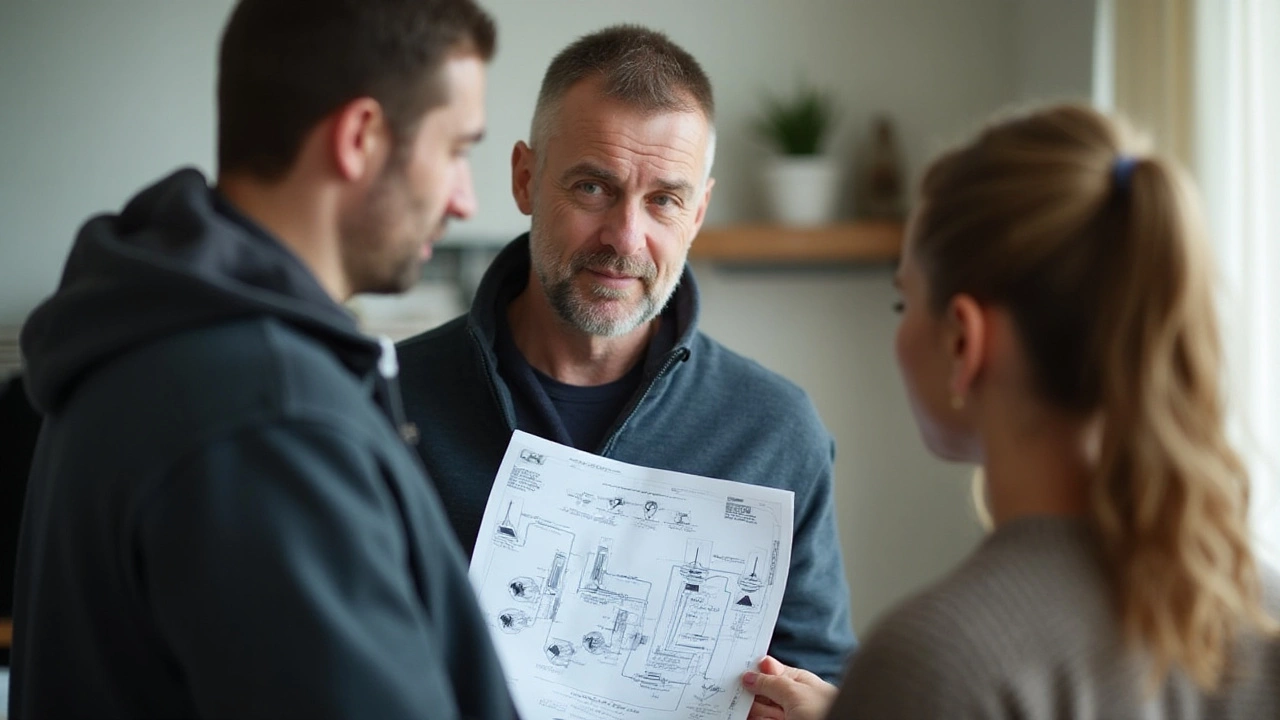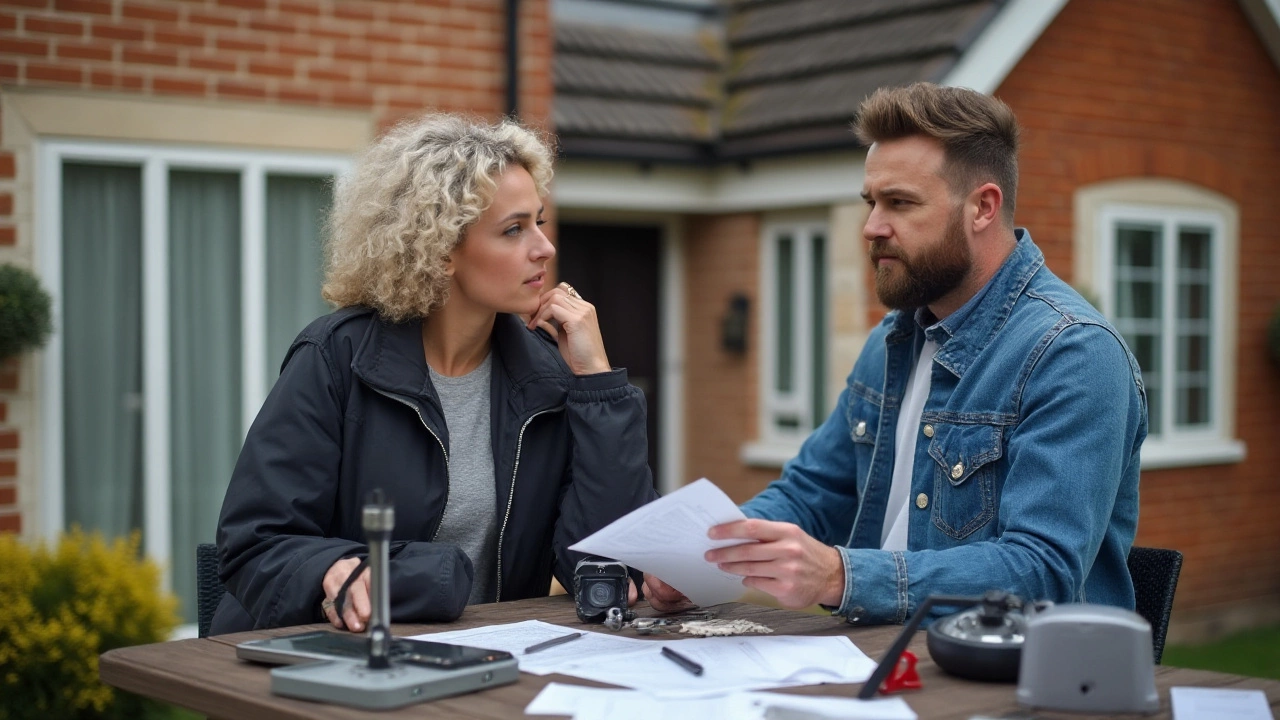These days, more and more folks are adding CCTV cameras to their homes and businesses. But one mystery that often baffles many is the cost of hiring a professional to do the installing. What exactly is a reasonable hourly rate for a CCTV installer? Let's unravel it.
First up, it’s key to understand that rates can vary. The skills needed, the complexity of your setup, and even your location can make a big difference in the price. But don’t worry, we’re here to break it down in simple terms.
- Understanding Installer Rates
- Factors Affecting Costs
- Typical Hourly Fees
- Additional Costs to Consider
- Getting Accurate Quotes
- Finding a Reliable Installer
Understanding Installer Rates
When exploring the realm of CCTV installation, getting your head around the hourly rate of a professional installer is crucial. This cost not only reflects the installer’s expertise but is also influenced by several practical elements. One key consideration is the level of experience and training the installer possesses. Installers with certifications and extensive field experience tend to charge more, but they often deliver better service and reduce the risk of errors. It's a classic case of getting what you pay for; seeking out a bargain could lead to unexpected complications down the line.
Geographical location also plays a significant role in how much you might pay. In urban areas where the cost of living is higher, expect to see increased rates. On the other hand, rural areas might offer lower rates, but finding qualified professionals can be a bit more daunting. Installation cost professionals often adjust their prices based on what’s typical in the local market, so doing your research can pay dividends when budgeting.
Another angle to ponder is the nature of the installation itself. Simpler setups, like placing a few cameras covering small areas, usually cost less than complex installations that involve multiple cameras, audio integration, or remote access features. The latter require more time and technical know-how, hence the higher cost. The scope of the project directly impacts the installer’s fee—so keep your project description detailed when discussing quotes.
A curious fact about the industry is its seasonal fluctuations. Believe it or not, the demand for CCTV installations often surges in late summer and early fall. Maybe after a summer of being away, property owners see the necessity of boosting security. With this in mind, scheduling your installation in the off-peak period might fetch you a better deal. According to TechSecurity, demand spikes during these months could lead to a 10-20% increase in standard rates.
Factors Affecting Costs
So, what are the elements that jumble up the numbers on a CCTV installer's invoice? First, let's talk about the type of system you're setting up. Whether you're just adding a couple of cameras to keep an eye on the backyard or embarking on a full-scale security upgrade for a business, the scope can significantly alter the costs. For example, more complex systems with numerous cameras and integrated alarms tend to drive the rates higher because they require precision and a deeper level of technical know-how. CCTV installation for large or advanced systems could mean higher hourly charges because of the skills and time involved.
Then there’s the question of location. Completely different ball game if you live in a bustling city compared to a tranquil little town. Urban areas often see higher rates due to the increased living expenses and the competitive nature of installation cost pricing in such environments. Don’t be surprised if your quote runs higher than your friend’s who lives out in the sticks. Geography can be tricky like that, affecting rates sometimes in unexpected ways.
"In areas with higher crime rates, homeowners tend to invest more in state-of-the-art CCTVs, impacting the demand and pay scale for installers," remarks John Doe, a security systems analyst.
Next up, consider the specific features of your system. Want some high-definition cameras with night vision or facial recognition? Fancy features usually come at a premium. More intricate setups consume more time, and an installer's expertise becomes not just handy, but essential. Ask yourself how customized your system needs to be. The more tailored the design, the more the cost potentially spikes as it involves more planning, programming, and perhaps additional tools or software.
Labor costs aren’t the only thing to look at. Sometimes, people forget about the *little extras*—additional supplies like cables, connectors, or mounts that aren’t included in the initial quote. An installer might charge you more based on what the system installation actually requires. Make sure to clarify whether your quote is all-inclusive or if you should brace for these added expenses.
Lastly, installers with a substantial amount of experience or certifications can understandably command higher fees. You are paying for their time, yes, but also for the trust in their work, ensuring the setup doesn’t just pass the initial test, but endures in the long run. A seasoned professional can provide insights and solutions specific to your setup, maybe even ones you hadn't thought necessary, or steer you away from potential pitfalls.
To sum it up, several factors push and pull at the price of hiring a professional for your security cameras. It’s more than just an hourly rate; it’s the type of system, your location, the complexities involved, additional equipment costs, and the expertise level of the installer. By understanding each of these points, you can navigate the costs more effectively and perhaps strike a better deal for your situation.

Typical Hourly Fees
Diving into the world of CCTV installation, it's essential to understand what sort of hourly fees you might be facing. Generally speaking, in the US, the average rate for hiring a professional installer hovers around the $75 to $150 range per hour. This variation often depends on the installer’s experience, the complexity of your project, and where you’re located. In metropolitan areas, installers may charge on the higher end of the scale due to increased living costs and demand for their services. But outside city limits, you might find more budget-friendly options.
When discussing rates, remember that the complexity of your installation could significantly influence the cost. For a basic setup that involves a handful of cameras and straightforward wiring, you might find installers charging closer to the lower end of the scale. However, if your project includes numerous cameras, advanced analytics features, or is in a tricky spot requiring additional labor or special tools, expect those hourly rates to climb. It’s crucial to get a detailed breakdown of what's included in the fee to avoid any surprises when the bill comes. As one seasoned installer put it, "The rate per hour is just part of it. It's about what you need done in that time that counts."
Let’s also shed some light on how these rates can stack up internationally. In the United Kingdom, for instance, the rate tends to sit around £30 to £60 per hour depending on similar factors like region and difficulty of the install. Moving over to Australia, the numbers are somewhat similar to the UK, suggesting a range of AUD 60 to AUD 100 an hour. Despite these figures, ensure you don’t sideline quality for savings; hiring a seasoned professional ensures your system not only functions correctly but lasts over time, minimizing future repair costs.
As with any service industry, the experience level and expertise of your installer could also sway the price you pay. It's not unusual for those with substantial credentials and years of experience to charge top dollar, seeing as their know-how ensures any potential issues are handled efficiently. That said, if budget is tight, find an installer with a solid reputation who is just starting – sometimes fresh eyes bring in a new level of commitment to getting the job done right without breaking the bank.
When assessing the total cost of security cameras installation, also be mindful of travel time. While many installers might include a certain radius in their pricing, long distances could accrue additional charges. Some might charge a flat travel fee, while others could tack on an extra hour or two at their standard rate. Always discuss this upfront as part of your initial inquiry to ensure there are no misunderstandings. Transparency here is key and can be a good indicator of the installer’s professionalism.
If you’re juggling between a couple of different options, don’t be shy about asking for itemized quotes. A comprehensive breakdown will let you see what each step costs, whether it's labor, individual installation costs, or any equipment supplies needed. This can also help you negotiate a better deal or identify elements where you could save a bit, perhaps by preparing the site yourself or performing basic tasks ahead of the professional's visit}
Additional Costs to Consider
When budgeting for CCTV installation, it's essential to consider more than just the hourly rate of the installer. One might find that the project involves a few extra expenses that are not immediately apparent. For instance, the type of cameras you choose can greatly impact the cost. Different security cameras come with varying price tags; some have advanced features like night vision or motion detection that naturally raise their price. Thus, it's important to make a list of needs and prioritize them before purchase. Another potential cost could stem from the need for additional hardware such as monitors, DVRs, or even signal boosters if you're working with a large property.
Installation can also reveal unforeseen challenges, like accessibility issues. If the property has difficult-to-reach areas or complex wiring needs, the installer might require specialized tools or additional manpower, adding to the budget. In older buildings, there might even be a need to upgrade existing wiring systems to handle the new technology, which is an extra cost on top of the initial quote. In many cases, labor hours could increase due to these complexities, which means paying more than expected.
Another important aspect to factor in is ongoing maintenance. Security systems often need routine check-ups to ensure they run smoothly. This usually incurs a separate fee, whether it's a bi-annual service to clean and check camera lenses and connections or software updates for digital systems. Some service providers offer maintenance packages at reduced rates when bundled with installation, so it’s worth inquiring about these when discussing your installation options.
According to a recent report from Home Security Journal, "Investing in a comprehensive CCTV system also involves costs for proper upkeep. Without regular maintenance, even the most expensive systems can fall short, costing more in the long run."
Finally, permit fees or other jurisdictional costs may apply depending on where you live. Some regions require permits for outdoor camera installations, particularly if they're directed toward public areas. Ignoring these requirements can lead to fines, so consulting with local authorities or your installer about these regulations is wise. Being informed and prepared for these additional costs helps homeowners and businesses plan ahead and keep their security projects within budget.

Getting Accurate Quotes
Finding a reliable quote for your CCTV installation is a bit like piecing together a puzzle. You want to ensure every piece fits perfectly, offering a clear picture of what you're paying for and why. When it comes to obtaining precise quotations, there are some key factors you shouldn't overlook. Start by reaching out to multiple installers to get a rounded view of the market rates. This approach ensures you're not stuck paying an inflated price and gives you a sense of the average hourly rate charged by most professionals. Breaking it down, a good start is to ask for quotes from at least three different companies. More quotes equal more data points to compare, getting you closer to the actual market rate.
When reaching out to installers, make sure your communication is crystal clear. Provide detailed information about your security needs. Are you looking to cover a small area or indeed something more elaborate like a sprawling campus? Do you need cameras with night vision or motion sensors? Every detail you give helps the installer craft a more accurate estimate. Being specific about what you need—and don’t need—can prevent unexpected costs from sneaking up on you. Also, ask questions if any part of the quote isn't clear. Don't hesitate to ask for clarifications, because full understanding today prevents disagreements tomorrow.
It's not just about gathering different prices; understanding what’s included in those figures is vital. Make sure each quote is broken down into understandable parts. A savvy installer should provide a clear breakdown of labor, equipment, and any additional costs. Some companies might include the cost of initial consultations, site assessments, or even maintenance and troubleshooting post-installation. If you come across hidden charges masquerading in fine print, try to weed them out early. Sometimes it's nice to remember what Scott Morrison, an Australian politician, once said:
"Transparency is the best policy."This thinking can be applied to getting quotes, ensuring you know exactly what you're signing up for.
As you sift through your gathered quotes, take a moment to research each company’s reputation. Dive into reviews and testimonials, or ask around if anyone you know has worked with them before. A company might dangle a too-good-to-be-true price tag without maintaining a standard of quality and service, so balancing cost with quality is imperative. Here, consider spending a bit more for a reputable name rather than chasing the lowest quote. It's not just about finding the lowest charge, but also ensuring good value and peace of mind in the long run.
Finding a Reliable Installer
When you're on the hunt for a trustworthy installer for your CCTV installation, the task can seem daunting at first. Picture this: you’ve already committed to investing in security cameras, and now, the next step is ensuring they’re installed by someone who knows the ropes. But how do you even begin to sift through all the options? Here’s a roadmap to navigate your way through. Start by checking reviews online, not just for overall sentiments but to get a feel of any recurring issues. Websites like Trustpilot or Google Reviews give a broad picture of customer satisfaction. People don’t hold back when they’re upset, so those reviews can provide invaluable insights into the installer’s reliability and craftsmanship.
Next up, ask around. There’s nothing quite like a personal recommendation from someone you trust. Friends, family, or colleagues may have had recent experiences with security camera installations and can point you towards someone reputable. Networking within local social media groups or community forums can also yield effective recommendations. A personal referral’s weight cannot be overstated; it combines first-hand experience with social trust, which is invaluable.
According to a 2023 report from Home Security Magazine, "Word-of-mouth referrals consistently outrank other methods in trustworthiness. In fact, 85% of consumers report they trust recommendations from friends and family above all other sources."
Don’t shy away from asking the installer about their hourly rate breakdown. A professional will be transparent about why they charge, what they charge. It’s also wise to discuss potential additional costs from the outset, such as wiring or hardware surprises. Make sure you’re aligned on the scope and total budget so there’s no awkward haggling halfway through. Draw clear boundaries and expectations before the tools even come out of the box.
Certifications and Experience Matter
Keep certifications and associations in mind. A well-experienced installer usually holds specific accreditation from recognized industry bodies. In many regions, you can verify their licenses, giving you further assurance of their qualifications. Installers often attend workshops and courses to refine their skills and stay on top of technological advancements. This ongoing education is a testament to their commitment and professionalism in providing top-tier installation services.
If possible, try to visit a few sites where they have completed previous work. Seeing their handiwork in action is better than any verbal promise. Does their job stand the test of time? Talk to the users of installed systems; how’s it fared over the years? An installer with security cameras bolted in various locations would be happy and proud to showcase it.
- Verify their qualifications and licenses.
- Ask for a detailed quote.
- Seek recent references or site visits.
- Discuss any potential hidden costs.
Lastly, trust your instincts. If something feels off during initial communications, it might be wise to keep looking. Reliability isn’t just about technical know-how; it’s equally about customer rapport and the assurance of being able to rely on them for follow-up support if needed. By checking these boxes, you won’t just find an installer; you’ll find a partner who can help secure your premises with efficiency and thoroughness.

